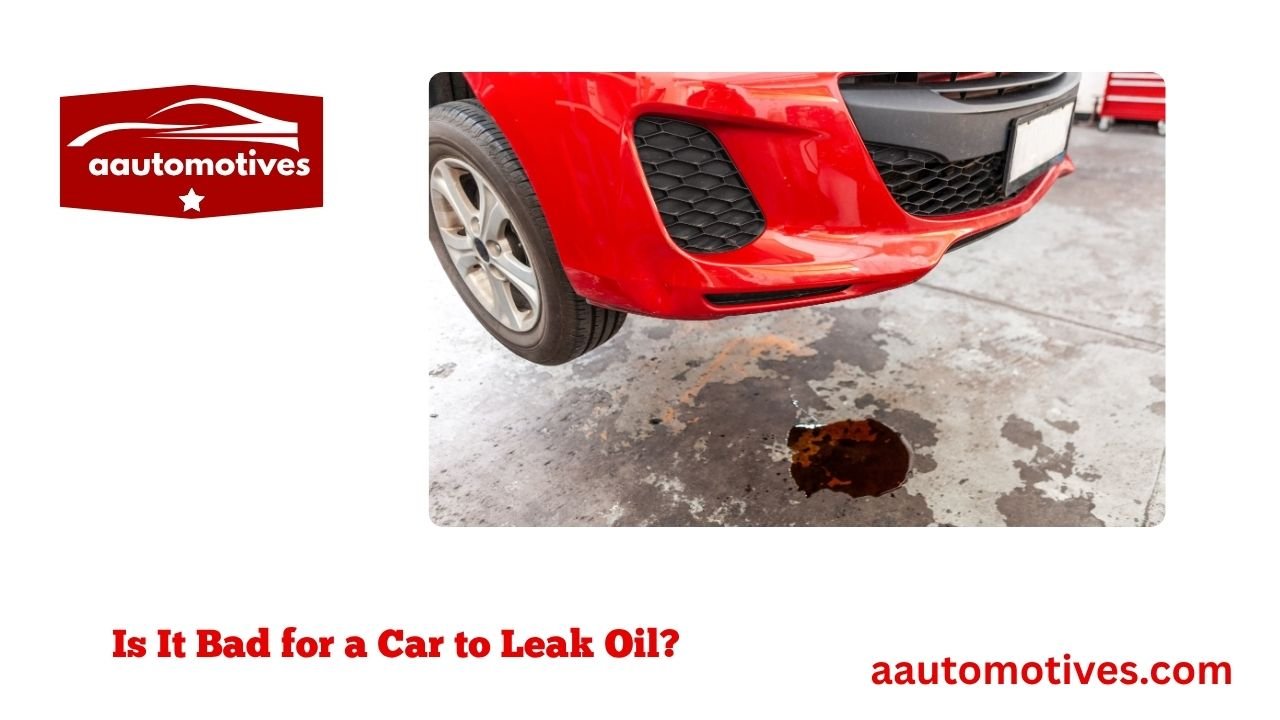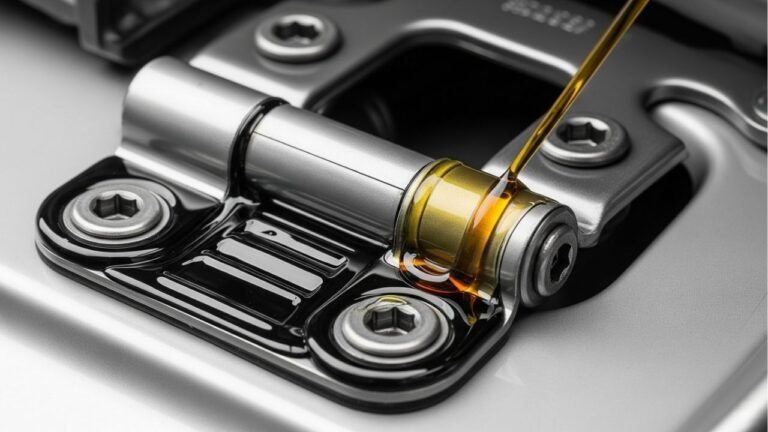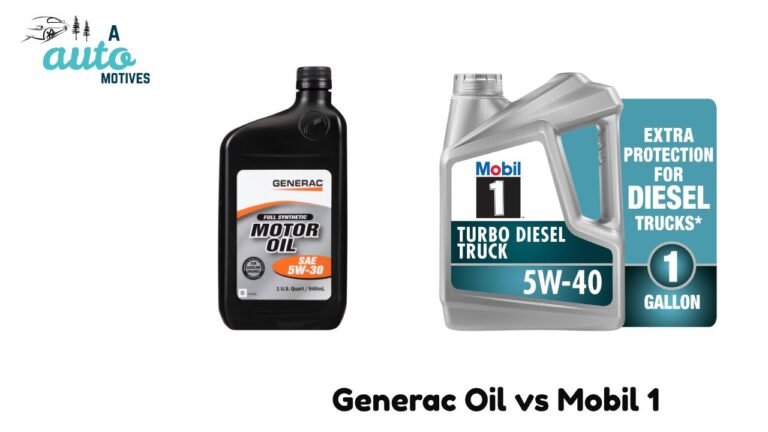Is It Bad for a Car to Leak Oil?

You’re heading to work, coffee in one hand, keys in the other. As you walk to your car, you notice a little dark puddle underneath. At first, you think it might be water. But when you touch it, it’s slick, greasy, and smells a bit off. Suddenly, a thought flashes across your mind: “Is it bad for a car to leak oil?” The short answer? Yes. But let’s go deeper into why that’s the case—and what you should do next.
Oil is like the lifeblood of your engine. Without it, the engine parts grind together, heat up, and eventually break down. So when your car starts leaking oil, even just a little, it’s like your body losing blood—it may not seem like a big deal at first, but over time, it can lead to serious problems.
In this guide, we’ll explore why oil leaks happen, what causes them, how to spot early warning signs, and most importantly, what you should do about it. If you’ve ever wondered, “is it bad for a car to leak oil,” you’re in the right place.
Why Oil Is So Important to Your Car’s Health

Oil also keeps the engine cool by reducing friction. It helps collect dirt and tiny metal shavings and sends them to the oil filter. Without enough oil, these particles start causing real damage inside the engine. That’s when things get expensive.
Now imagine you’ve got a slow leak. You top it off every now and then, thinking it’s no big deal. But over time, the leak gets worse. One day, you’re out on a hot day, engine running hard, and boom—low oil pressure warning light comes on. Too late. Now you’re facing repairs that could cost thousands of dollars.
So to answer the question: is it bad for a car to leak oil? Absolutely. Even if it’s just a small leak, it’s a red flag your car is trying to wave at you.
What Causes a Car to Leak Oil?
If your car’s leaking oil, it’s usually not random. Something is either worn out, damaged, or loose. Here are some of the most common causes:
-
Worn out gaskets or seals
-
Loose oil filter or drain plug
-
Cracked oil pan
-
Damaged valve cover gasket
-
Overfilled oil
Imagine your car’s engine is a sealed container. Over time, the seals and gaskets that keep everything tight start wearing down. That’s normal with age, heat, and use. But once they crack or get brittle, oil starts seeping out.
Loose bolts on your oil filter or plug can also cause leaks. This often happens after an oil change. And sometimes, mechanics overfill the oil, which increases pressure and causes leaks around seals.
Take a look at this comparison table to understand the common causes and their risk level:
| Cause of Oil Leak | Common Location | Risk Level | Fix Cost Estimate |
|---|---|---|---|
| Worn Valve Cover Gasket | Top of engine | Medium | $100 – $350 |
| Loose Oil Drain Plug | Bottom of oil pan | Low | $20 – $100 |
| Cracked Oil Pan | Under the engine | High | $200 – $600 |
| Broken Oil Filter Seal | Near the oil filter housing | Medium | $50 – $150 |
| Overfilled Oil | Varies | Low to Medium | $0 – $100 |
Seeing oil spots on your driveway isn’t just a cosmetic issue—it’s often a symptom of something deeper. So if you’re wondering, “is it bad for a car to leak oil,” remember this: a leak today could be a breakdown tomorrow.
How to Spot an Oil Leak Early
Catching an oil leak early can save you from huge repair bills. Thankfully, your car leaves clues.
First, check under the car after it’s been parked for a while. Do you see brown, amber, or black puddles or spots? That’s a sign. Also, take a whiff inside your car while it’s running. If it smells like burning oil, it might be dripping onto a hot engine part.
Next, look at your engine’s dipstick. If the oil level keeps dropping or you notice dark sludge, something’s not right.
Common signs of an oil leak:
-
Puddles or spots on the ground
-
Low oil levels despite regular refills
-
Burning smell from the engine
-
Blue smoke from the exhaust
-
Oil warning light on the dashboard
Once you spot these signs, don’t ignore them. A small leak can grow fast. That’s why it’s critical to act fast when asking yourself, “is it bad for a car to leak oil?”
Is Driving With an Oil Leak Dangerous?
Let me tell you a quick story. My cousin once ignored an oil leak in his old Honda. It was just a small drip at first. A few weeks later, he was driving home late at night when the engine seized. Just like that—total failure. The repair bill? Over $2,500. He ended up selling the car for parts.
That’s the risk you take when you drive with an oil leak. It’s not just a mechanical issue—it’s a safety risk. If oil hits hot parts like the exhaust manifold, it can even cause a fire. That’s not fear-mongering. It’s a real hazard.
And if your car loses too much oil, the engine will run with poor lubrication. This causes overheating, metal-on-metal grinding, and eventually a full-blown breakdown.
So, is it bad for a car to leak oil? Yes—because it puts both your engine and your safety at risk.
The Emotional Cost of Ignoring an Oil Leak
Let’s step back for a second. Car problems aren’t just about money. They’re stressful. That sick feeling in your stomach when something goes wrong, the anxiety of being stranded, the fear of expensive repairs—it all adds up.
You might delay the mechanic visit because life is already chaotic. I get it. Work, bills, kids, life—it all pulls you in different directions. But ignoring that oil leak doesn’t make it go away. It just makes things harder down the road.
If you’ve ever asked, “is it bad for a car to leak oil,” it means you already know something’s wrong. That’s your gut talking. Trust it.
When Should You See a Mechanic?
Not all oil leaks are disasters waiting to happen—but it’s hard to tell the difference without popping the hood. So when should you head to a mechanic?
-
If you see visible oil puddles
-
If your oil light turns on
-
If there’s a burning smell when the engine runs
-
If the oil level drops constantly
-
If your car smokes or sputters
Mechanics have tools like UV dye tests and pressure checks to find the exact source. It’s usually a fast diagnosis, and many oil leak fixes are affordable—if caught early.
Waiting too long turns a $100 gasket repair into a $1,000+ engine overhaul. That’s why the answer to “is it bad for a car to leak oil” is always yes—because the risks grow fast.
Can You Fix an Oil Leak Yourself?
If you’re handy and don’t mind getting your hands dirty, you might wonder—can I fix this myself? The short answer is: sometimes. Small leaks, like a loose drain plug or a worn-out oil filter gasket, are DIY-friendly. But others, especially if they involve cracked pans or internal gaskets, are best left to a pro.
Here’s a basic checklist for DIY oil leak repairs:
-
Check the oil filter – Is it tight? Was it replaced properly?
-
Inspect the drain plug – Is it cross-threaded or loose?
-
Look for visible wet spots – Use a flashlight to check around the engine.
-
Use an oil leak stop additive – Temporary fix, but might slow the leak.
-
Tighten bolts—but not too much – Over-tightening can make the leak worse.
Still, even if you’re a weekend mechanic, always ask yourself: Am I confident this fix will hold? Because if you mess up, the oil could gush out on the freeway—and that’s more than just a spill.
So again, is it bad for a car to leak oil? Yes—and even riskier if you try to fix it unprepared.
The Hidden Costs of Delaying a Repair
Let’s break it down.
You think ignoring the oil leak saves you money. But every time your engine runs with low oil, you’re inviting wear and tear. What starts as a $15 bottle of oil turns into:
-
Damaged engine bearings – $1,500+
-
Ruined timing chain – $800+
-
Complete engine rebuild – $3,000 or more
That doesn’t even include the indirect costs: tow truck fees, missed work, the stress of being stranded. And if you’re on a road trip? That leak could turn your getaway into a roadside nightmare.
There’s also the environmental impact. Oil leaks aren’t just messy—they’re harmful. When it rains, leaked oil washes into storm drains and pollutes water sources. It kills wildlife and poisons ecosystems.
So when you ask, “is it bad for a car to leak oil,” you’re also asking, “what’s the long-term cost of doing nothing?” The answer is: way more than just money.
Tips to Prevent Oil Leaks in the First Place
An ounce of prevention, right? Keeping your engine sealed and happy isn’t rocket science—it just takes a little care.
Here’s how you can reduce the chance of future oil leaks:
-
Stick to regular oil changes – Old oil breaks down and loses protection.
-
Use high-quality engine oil – Especially synthetic oil for better longevity.
-
Replace gaskets and seals as they age – Don’t wait for them to fail.
-
Don’t overfill the oil – Check the dipstick and avoid topping up too much.
-
Have your engine inspected every 6 months – Catch small issues early.
Also, park in the same spot when possible. It helps you notice any new leaks faster. A dry driveway means peace of mind.
Maintaining your car’s oil system is like brushing your teeth—small daily habits save you from big pain later. And again, is it bad for a car to leak oil? Definitely. But it’s also preventable with a little TLC.
How Long Can You Drive With an Oil Leak?
Let’s be honest: many people still drive with leaks. Life gets busy. But here’s the deal—you’re playing roulette every time you turn the key.
If it’s a slow seep, you might get by for a few weeks, but you need to monitor it daily. If it’s dripping heavily? Stop driving immediately.
Quick tips:
-
Check oil daily – Use the dipstick before every drive.
-
Top off if low – But don’t assume this is a solution.
-
Avoid high-speed driving – Heat and pressure make leaks worse.
-
Plan a repair date now – Don’t wait for a breakdown.
Every minute you drive with a leak, your engine suffers. So if you’re asking, “is it bad for a car to leak oil,” remember—it’s not just bad. It’s risky.
Emotional Peace of Fixing the Leak
There’s something satisfying about getting that leak fixed. No more spots on the driveway. No more anxious glances at the dashboard. And definitely no more last-minute oil top-ups at gas stations.
It’s not just about protecting your engine. It’s about reclaiming peace of mind. You know your ride is reliable. You trust it to get you where you’re going—without leaving a trail behind.
So yes, fixing that oil leak might take a Saturday afternoon or a trip to the shop. But it pays you back every time you turn the key and drive off with confidence.
Frequently Asked Questions (FAQs)
1. How do I know if it’s really oil leaking from my car?
Check the color and texture. Motor oil is usually dark brown or amber and feels slick to the touch. If the spot under your car is clear or smells like coolant, it might be something else.
2. Can I use oil leak additives to stop the leak?
Additives can slow or temporarily seal small leaks, especially in older engines. But they’re a band-aid, not a cure. Use them only while planning a permanent fix.
3. Is an oil leak dangerous while driving?
Yes. It can cause engine failure or even fires if oil drips on hot parts. Don’t take the risk. Get it checked.
4. Can an oil leak damage my engine permanently?
If left unchecked, yes. Lack of lubrication causes internal damage like bearing failure, scoring, and overheating.
5. Will insurance cover oil leak repairs?
Usually not. Most standard car insurance policies don’t cover wear and tear or maintenance issues like oil leaks.
6. How much does it cost to fix an oil leak?
It depends. A simple fix like a gasket might cost under $150. Bigger jobs like replacing a cracked oil pan can run into hundreds.
7. What happens if I ignore a slow oil leak?
It will get worse over time. What starts as a few drops can turn into a serious leak that damages your engine and costs you thousands.
8. Can I trade in or sell my car with an oil leak?
You can, but expect a lower offer. Dealers will deduct repair costs, and private buyers might walk away.
Final Thoughts
So, is it bad for a car to leak oil? You already know the answer. It’s bad for your engine, bad for your wallet, bad for the environment—and bad for your peace of mind.
But it’s not hopeless. You can spot it early. You can fix it affordably. You can prevent it with care. Don’t wait for a warning light to force your hand. If your car’s leaking oil, act now—and keep your ride running smooth for years to come.






